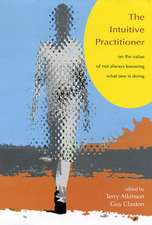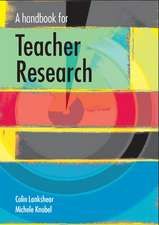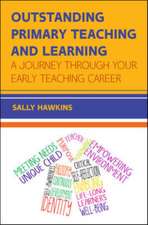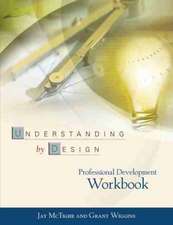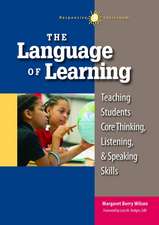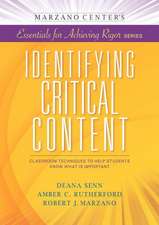How to Succeed in Academics
Autor Edward R.B. McCabe, Linda L. McCabeen Limba Engleză Paperback – 13 dec 1999
- Provides the unwritten rules for success and "tells it like it is"
- Chapters are organized to help you develop and market your career and determine how to organize your curriculum vitae
- Includes vignettes to illustrate possible pitfalls in academics and strategies on how to avoid them, or how to select the most effective course of action
- Guides you step-by-step through the process of writing grant proposals, abstracts, slide preparation, poster preparation, and presentations
- Provides timelines to estimate your overall career progress or for specific tasks such as grant writing
- Describes negotiation techniques to assist you in interactions with your mentor, your department chair, grant officers, and journal editors
- Summarizes content of each chapter in paragraph subheadings to facilitate reading
Preț: 253.52 lei
Nou
Puncte Express: 380
Preț estimativ în valută:
48.52€ • 50.34$ • 40.55£
48.52€ • 50.34$ • 40.55£
Carte tipărită la comandă
Livrare economică 10-24 martie
Preluare comenzi: 021 569.72.76
Specificații
ISBN-13: 9780124818330
ISBN-10: 0124818331
Pagini: 176
Dimensiuni: 152 x 229 x 13 mm
Greutate: 0.27 kg
Editura: ELSEVIER SCIENCE
ISBN-10: 0124818331
Pagini: 176
Dimensiuni: 152 x 229 x 13 mm
Greutate: 0.27 kg
Editura: ELSEVIER SCIENCE
Public țintă
Undergraduates and postgraduate students, postdoctoral fellows, and new lecturers interested in developing a career in academia, particularly those in the sciences and medicine; serves both the individual reader and as a text for workshops on career development.Cuprins
Preface.
Introductory Overview: Establishing Personal Goals and Tracking Your Career.
Selecting a Training Environment: Choosing a Training Program, Training Institution, and Mentor.
Selecting a Position in Academia: Choosing a Department, Institution, and Mentor.
Selecting Grant Opportunities: Understanding the Organization of the NIH, Other Governmental Entities, and Private Foundations.
Writing a Grant: Selecting the Specific Aims, Preparing the Budget, and Developing the Research Proposal.
Grant Review: How Review Groups Work, Responding to the Reviewers' Feedback, and Preparing the Revised Application.
Preparation of Abstracts for Scientific Meetings.
Presentations at Scientific Meetings: Preparation of Effective Slides and Posters.
The 10-Minute Talk.
The 1-Hour Talk, Including the Job Application Seminar.
Selecting a Journal: Instructions for Authors, Recommending Reviewers, and Submitting the Manuscript.
How to Write Research Papers.
How to Write Review Articles and Chapters.
Manuscript Review.
Ethical Behavior.
Leadership.
Preparing a Curriculum Vitae.
Summary: Gauging Success.
Index.
Introductory Overview: Establishing Personal Goals and Tracking Your Career.
Selecting a Training Environment: Choosing a Training Program, Training Institution, and Mentor.
Selecting a Position in Academia: Choosing a Department, Institution, and Mentor.
Selecting Grant Opportunities: Understanding the Organization of the NIH, Other Governmental Entities, and Private Foundations.
Writing a Grant: Selecting the Specific Aims, Preparing the Budget, and Developing the Research Proposal.
Grant Review: How Review Groups Work, Responding to the Reviewers' Feedback, and Preparing the Revised Application.
Preparation of Abstracts for Scientific Meetings.
Presentations at Scientific Meetings: Preparation of Effective Slides and Posters.
The 10-Minute Talk.
The 1-Hour Talk, Including the Job Application Seminar.
Selecting a Journal: Instructions for Authors, Recommending Reviewers, and Submitting the Manuscript.
How to Write Research Papers.
How to Write Review Articles and Chapters.
Manuscript Review.
Ethical Behavior.
Leadership.
Preparing a Curriculum Vitae.
Summary: Gauging Success.
Index.
Recenzii
"... a concise and informatively written overview of building an academic career. The advice is practical and will, undoubtedly, be of great help to young students, residents and fellows embarking on such a career. While such a guide does not obviate the necessity for personal mentoring of young people, this handbook will remain useful through many phases of an early career in academic medicine." --KURT HIRSCHHORN, M.D., Professor of Pediatrics, Mount Sinai School of Medicine
"How to Succeed in Academics is an easy-to-read, practical and very useful guide to almost all aspects of the early stages of academic life. A particularly appealing feature is the set of concise and well thought out paragraph headings. These allow one to get the gist of a whole chapter very quickly, and to zero in on sections of particular interest. The chapter on grant writing was particularly informative, containing many suggestions useful to myself (not an academic neophyte). Young academics will gain a lot of savvy quickly from this guide." --EATON LATTMAN, Ph.D., Department of Biophysics, Johns Hopkins University
"...a splendid blueprint for some one on the ground who is about to begin the climb on the first rung of the academic ladder. It takes the reader through the necessary steps, explaining what is important, where the pitfalls may lie, and how to be prepared for each step." --MICHAEL KATZ, M.D., Vice President for Research, March of Dimes
"How to Succeed in Academics is a wonderful book - it reads well, is intellectually stimulating, and it increases our capabilities to be successful in this difficult field. It should become a part of all fellowships curriculums and should certainly be available in every academic department." --PAUL RUDOY, M.D., Professor and Chair, Department of Pediatrics, University of Hawaii
"The authors teach by example, using vignettes on almost every page to describe real-life situations, ranging from the interview trip to dealing with unfair colleagues. One never tires of these stories of people and situations; each one presents fresh insights on how to handle things that inevitably arise during the course of a career." --DAVID SADAVA, Ph.D., Pritzker Foundation, Professor of Biology, Claremont Colleges
"I found the material presented to be easy to read, succinct and complete. It presents the trainee with all of the information necessary to help them succeed in an academic career. The publication is extremely comprehensive and effectively covers all of the important issues that a trainee or young faculty member may confront." --RALPH D. FEIGIN, M.D., President and CEO, Baylor College of Medicine
"I found the McCabes', How to Succeed in Academics to be a most helpful book. They have captured in a tightly written volume a wealth of academic experience, wisdom and common sense. More senior readers will readily identify with the case examples provided of those things we learned the hard way but are clearly examined here so that the uninitiated reader can avoid those pitfalls. I also found this a book full of academic honesty. The academic life is one of great competition and independence, and that is clearly described here, as well as the steps and process required for success. Overall, I highly recommend this book, especially to graduate students and postdocs." --PHILLIP A. WOOD, D.V.M.,Ph.D., Chair, Department of Comparative Medicine, University of Alabama, Birmingham
"How to Succeed in Academics is an easy-to-read, practical and very useful guide to almost all aspects of the early stages of academic life. A particularly appealing feature is the set of concise and well thought out paragraph headings. These allow one to get the gist of a whole chapter very quickly, and to zero in on sections of particular interest. The chapter on grant writing was particularly informative, containing many suggestions useful to myself (not an academic neophyte). Young academics will gain a lot of savvy quickly from this guide." --EATON LATTMAN, Ph.D., Department of Biophysics, Johns Hopkins University
"...a splendid blueprint for some one on the ground who is about to begin the climb on the first rung of the academic ladder. It takes the reader through the necessary steps, explaining what is important, where the pitfalls may lie, and how to be prepared for each step." --MICHAEL KATZ, M.D., Vice President for Research, March of Dimes
"How to Succeed in Academics is a wonderful book - it reads well, is intellectually stimulating, and it increases our capabilities to be successful in this difficult field. It should become a part of all fellowships curriculums and should certainly be available in every academic department." --PAUL RUDOY, M.D., Professor and Chair, Department of Pediatrics, University of Hawaii
"The authors teach by example, using vignettes on almost every page to describe real-life situations, ranging from the interview trip to dealing with unfair colleagues. One never tires of these stories of people and situations; each one presents fresh insights on how to handle things that inevitably arise during the course of a career." --DAVID SADAVA, Ph.D., Pritzker Foundation, Professor of Biology, Claremont Colleges
"I found the material presented to be easy to read, succinct and complete. It presents the trainee with all of the information necessary to help them succeed in an academic career. The publication is extremely comprehensive and effectively covers all of the important issues that a trainee or young faculty member may confront." --RALPH D. FEIGIN, M.D., President and CEO, Baylor College of Medicine
"I found the McCabes', How to Succeed in Academics to be a most helpful book. They have captured in a tightly written volume a wealth of academic experience, wisdom and common sense. More senior readers will readily identify with the case examples provided of those things we learned the hard way but are clearly examined here so that the uninitiated reader can avoid those pitfalls. I also found this a book full of academic honesty. The academic life is one of great competition and independence, and that is clearly described here, as well as the steps and process required for success. Overall, I highly recommend this book, especially to graduate students and postdocs." --PHILLIP A. WOOD, D.V.M.,Ph.D., Chair, Department of Comparative Medicine, University of Alabama, Birmingham


